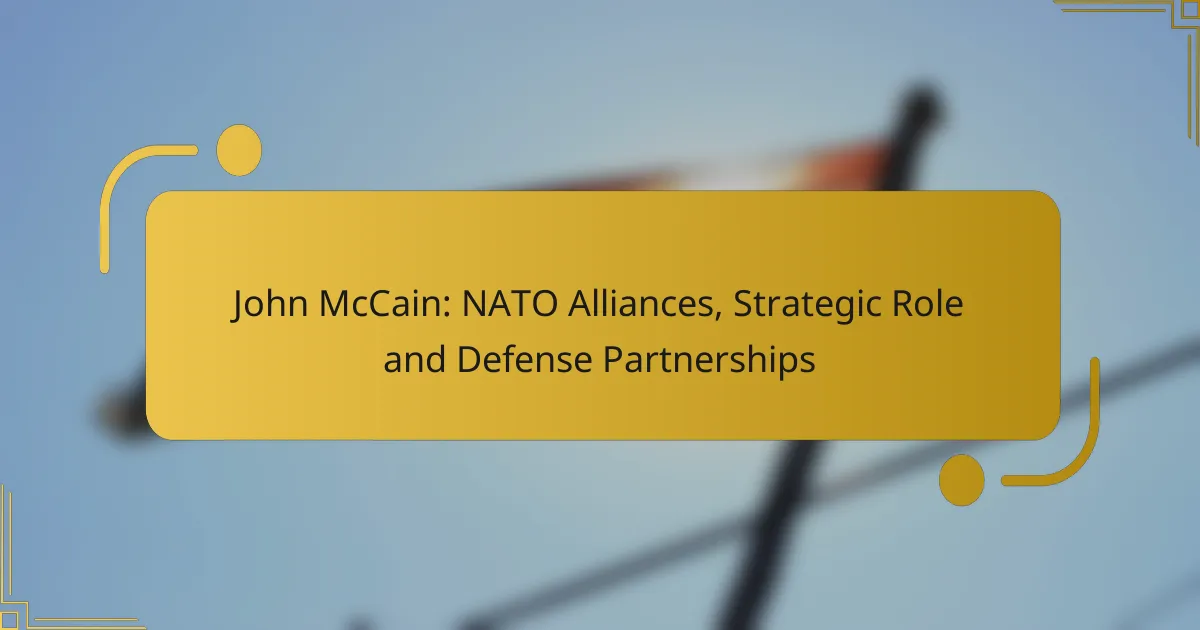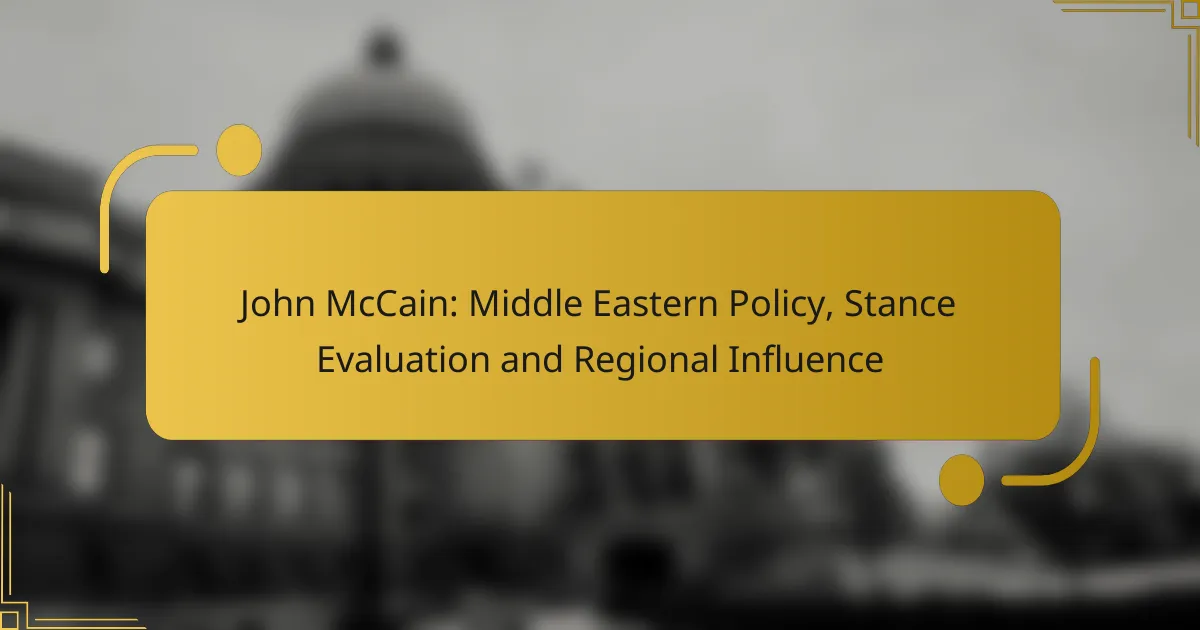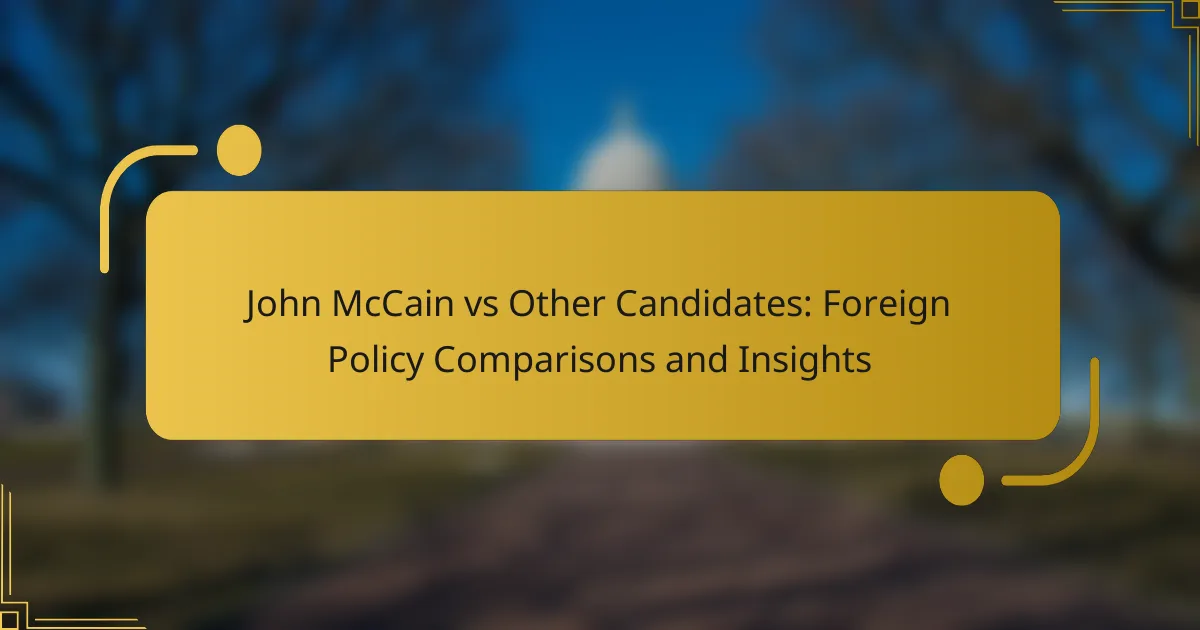John McCain was a key figure in shaping NATO alliances, emphasizing the importance of collective defense and transatlantic unity. His advocacy for the expansion of NATO and stronger defense partnerships significantly contributed to global security and stability, particularly in addressing challenges faced by Eastern European nations. Through his leadership, McCain reinforced the strategic role of NATO in maintaining peace among member countries.
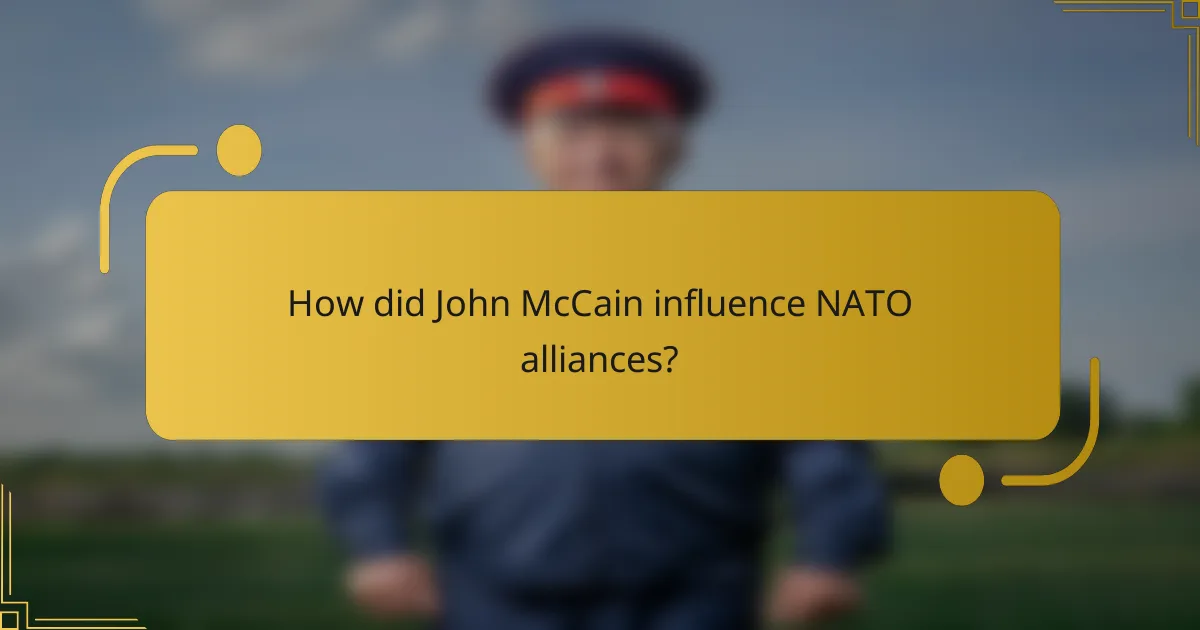
How did John McCain influence NATO alliances?
John McCain significantly shaped NATO alliances through his unwavering commitment to collective defense, transatlantic unity, and the expansion of NATO. His advocacy helped reinforce the importance of these alliances in ensuring global security and stability.
Advocacy for collective defense
McCain was a staunch supporter of NATO’s Article 5, which states that an attack on one member is an attack on all. He emphasized that this principle is crucial for deterring aggression and maintaining peace in Europe and beyond.
His advocacy included urging member states to meet their defense spending commitments, often recommending that NATO countries allocate at least 2% of their GDP to defense. This financial commitment strengthens collective defense capabilities and ensures readiness against potential threats.
Promotion of transatlantic unity
McCain believed that a strong transatlantic relationship was essential for addressing global challenges. He frequently called for collaboration between the United States and European allies to tackle issues like terrorism and cybersecurity.
He also championed diplomatic efforts to resolve conflicts, arguing that unity among NATO members enhances their negotiating power and effectiveness on the global stage. McCain’s initiatives often included joint military exercises to foster cooperation and trust among allies.
Support for NATO expansion
McCain was a key proponent of NATO’s eastward expansion, advocating for the inclusion of countries like Poland, Hungary, and the Baltic states. He argued that expanding NATO would enhance security in Eastern Europe and deter Russian aggression.
His support for NATO enlargement was rooted in the belief that integrating more nations into the alliance would create a stronger collective defense framework. McCain often highlighted the importance of supporting aspiring NATO members, encouraging reforms that align with NATO standards.
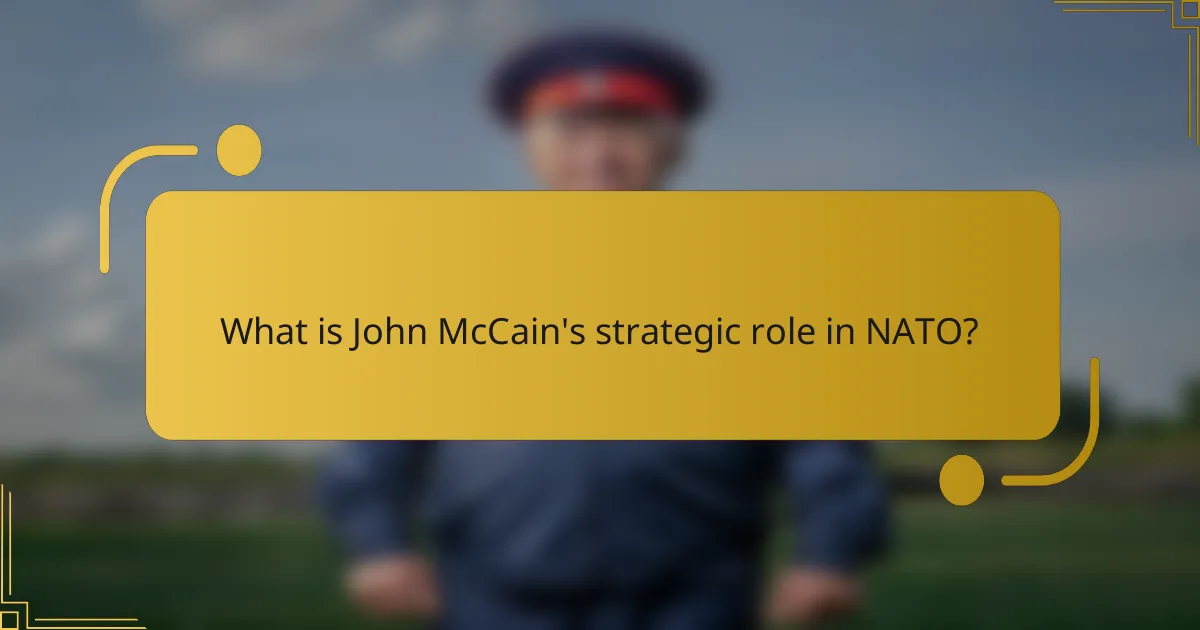
What is John McCain’s strategic role in NATO?
John McCain played a pivotal role in shaping NATO’s strategic direction, advocating for strong transatlantic ties and collective defense. His leadership emphasized the importance of NATO in addressing global security challenges and maintaining peace among member nations.
Key legislative initiatives
Throughout his career, McCain championed several legislative initiatives aimed at strengthening NATO alliances. He supported increased defense budgets for member countries, promoting the idea that all NATO allies should meet the guideline of spending at least 2% of their GDP on defense. This push was crucial for enhancing military readiness and ensuring equitable burden-sharing among allies.
McCain also advocated for the NATO Support Act, which aimed to bolster U.S. support for NATO operations and enhance military cooperation among member states. His initiatives often focused on countering threats from adversaries, particularly in Eastern Europe, by reinforcing NATO’s presence and capabilities in those regions.
Leadership in defense committees
As a long-serving member and former chairman of the Senate Armed Services Committee, McCain was instrumental in shaping U.S. defense policy related to NATO. His leadership helped facilitate discussions on military strategy, defense budgets, and international partnerships, ensuring that NATO remained a priority in U.S. foreign policy.
McCain’s influence extended to various defense committees where he pushed for bipartisan support for NATO initiatives. He emphasized the need for a united front against common threats, fostering collaboration among committee members to enhance NATO’s strategic posture and operational effectiveness.

How did John McCain shape defense partnerships in Europe?
John McCain significantly influenced defense partnerships in Europe by advocating for stronger alliances and enhancing military cooperation among NATO members. His efforts focused on reinforcing transatlantic ties and supporting Eastern European nations in their defense initiatives.
Strengthening US-European relations
McCain emphasized the importance of robust US-European relations, arguing that a united front is essential for addressing global security challenges. He championed increased military spending among NATO allies to meet the alliance’s defense commitments, encouraging countries to allocate at least 2% of their GDP to defense.
Through his leadership, McCain fostered initiatives that promoted joint military exercises and intelligence sharing, enhancing interoperability between US and European forces. These efforts helped build trust and cooperation, ensuring that NATO could respond effectively to emerging threats.
Collaboration with Eastern European nations
McCain was a strong advocate for Eastern European nations, particularly those facing security threats from Russia. He supported initiatives that provided military aid and training to countries like Poland, the Baltic states, and Ukraine, helping them bolster their defense capabilities.
His commitment to these nations included pushing for the establishment of NATO’s Enhanced Forward Presence, which stationed multinational battlegroups in Eastern Europe. This strategic move aimed to deter aggression and reassure Eastern European allies of US support, reinforcing their defense partnerships within the NATO framework.
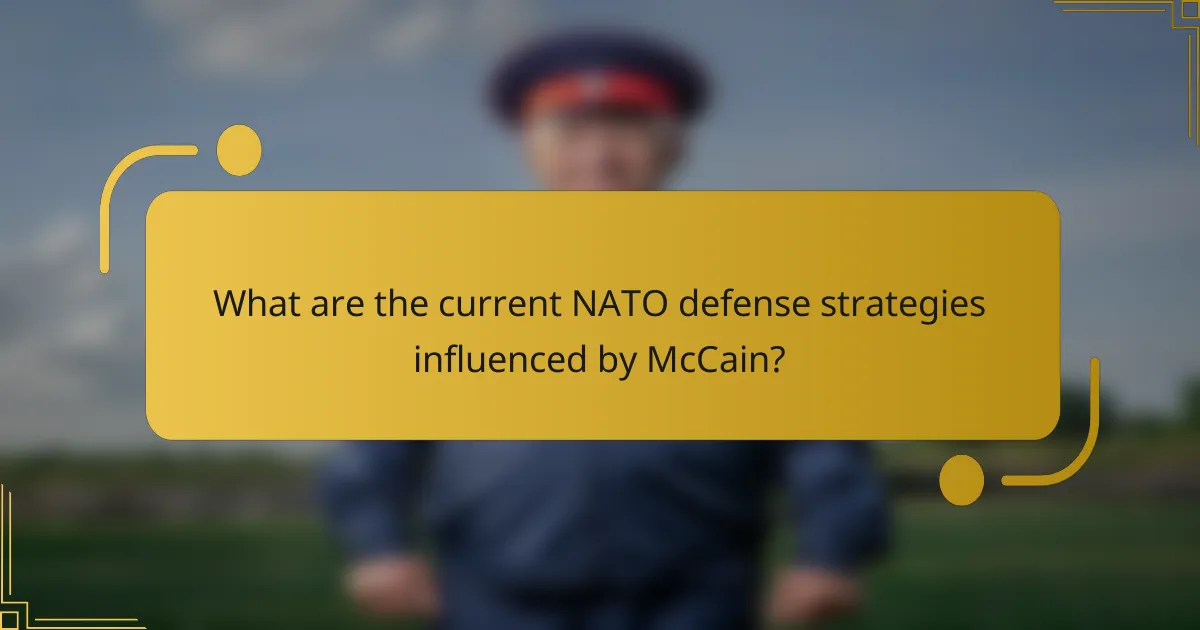
What are the current NATO defense strategies influenced by McCain?
Current NATO defense strategies, shaped significantly by John McCain’s advocacy, emphasize collective defense, enhanced deterrence, and a strong response to emerging threats. These strategies focus on adapting to geopolitical challenges while ensuring member states are prepared for both conventional and unconventional warfare.
Enhanced deterrence measures
Enhanced deterrence measures are crucial for NATO’s strategy, aiming to prevent aggression through a show of strength and readiness. This includes increasing troop deployments in Eastern Europe and conducting regular military exercises to demonstrate unity and capability among member states.
For example, NATO has established multinational battlegroups in countries like Poland and the Baltic states, which serve as a visible deterrent against potential threats. These forces can be rapidly deployed, showcasing NATO’s commitment to collective defense under Article 5 of the North Atlantic Treaty.
Focus on cybersecurity
NATO’s focus on cybersecurity has intensified in response to the growing threat of cyberattacks on member nations. This involves not only protecting military networks but also supporting civilian infrastructure against potential cyber threats from state and non-state actors.
Member states are encouraged to share intelligence and best practices in cybersecurity, enhancing collective resilience. Initiatives like the NATO Cyber Defence Centre of Excellence in Estonia provide training and resources to improve national cyber defenses, ensuring that NATO remains prepared to counteract cyber threats effectively.
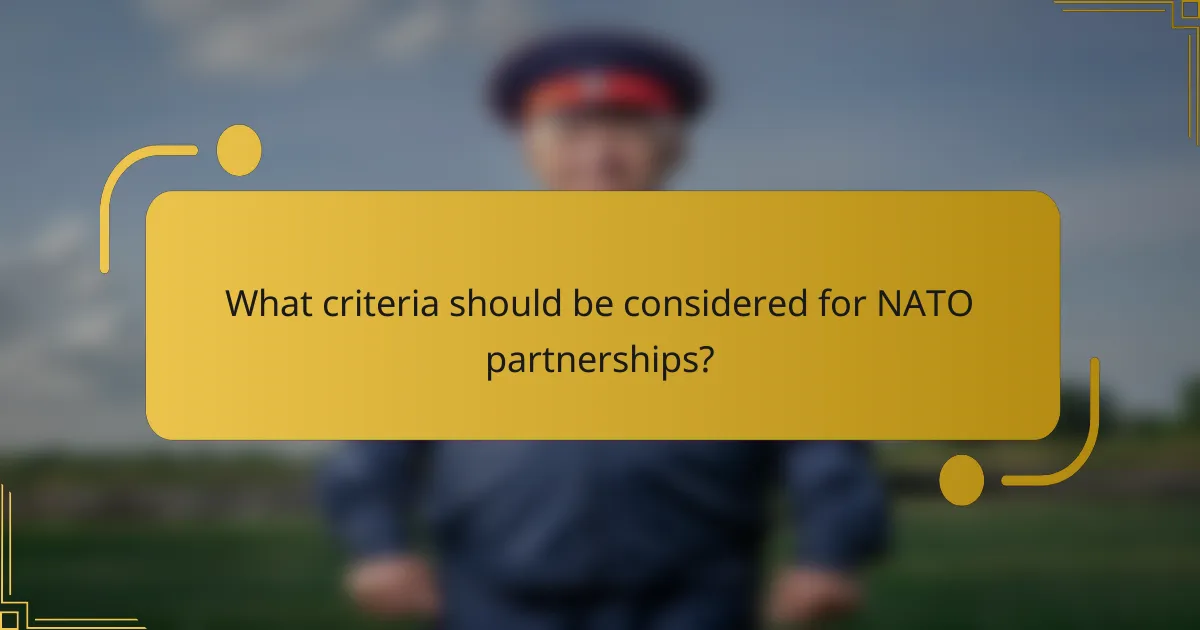
What criteria should be considered for NATO partnerships?
Key criteria for NATO partnerships include geopolitical stability, military capability assessments, and shared values among member nations. These factors help ensure that alliances are effective and contribute to collective security.
Geopolitical stability
Geopolitical stability is crucial for NATO partnerships as it determines the likelihood of conflict and the overall security environment. Nations that exhibit stable governance, economic resilience, and low levels of internal strife are more likely to contribute positively to NATO objectives.
When assessing geopolitical stability, consider factors such as regional conflicts, historical tensions, and alliances with other nations. For example, countries in Eastern Europe may be prioritized for partnerships due to their strategic location and potential threats from neighboring states.
Military capability assessments
Military capability assessments evaluate a nation’s defense resources, readiness, and technological advancements. NATO looks for partners that can contribute effectively to collective defense operations and meet certain military standards.
Key aspects of military capability include troop numbers, equipment quality, and logistical support. Countries with modernized forces and a commitment to defense spending—typically around 2% of GDP—are often seen as more viable partners. Regular joint exercises can also help gauge interoperability and readiness among NATO forces.
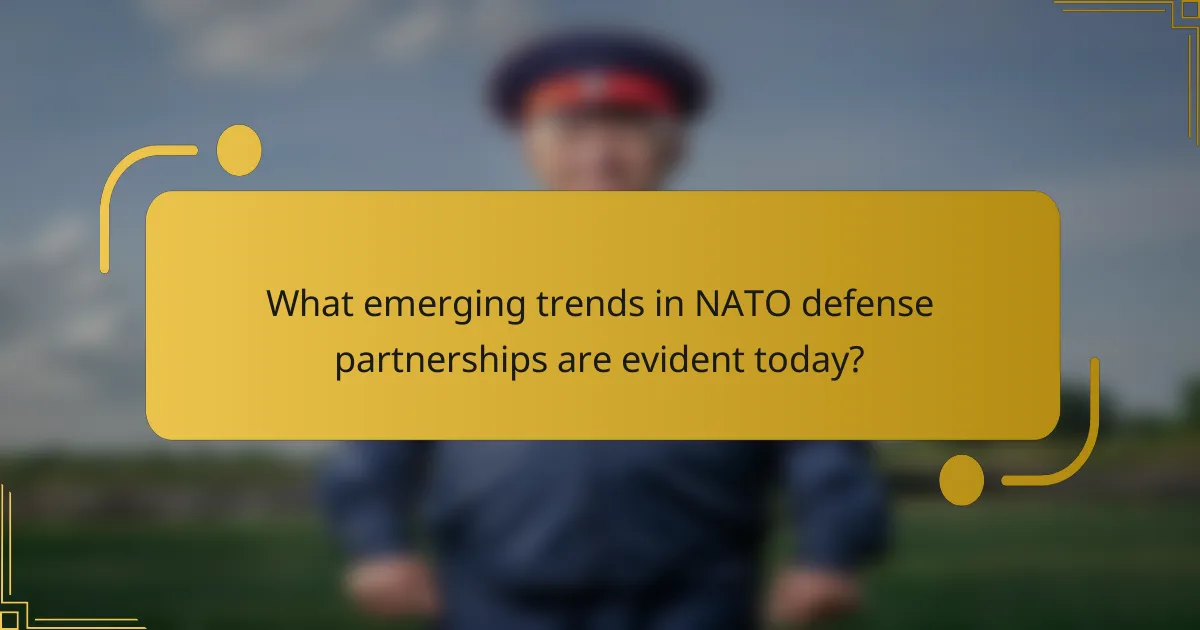
What emerging trends in NATO defense partnerships are evident today?
Today, NATO defense partnerships are increasingly characterized by a focus on hybrid warfare and a growing presence in the Asia-Pacific region. These trends reflect the alliance’s adaptation to new security challenges and its commitment to maintaining global stability.
Increased focus on hybrid warfare
NATO is placing greater emphasis on hybrid warfare, which combines conventional military tactics with irregular tactics, cyber operations, and information warfare. This shift is driven by the recognition that modern conflicts often involve a blend of military and non-military strategies.
Member states are enhancing their capabilities to counter hybrid threats through improved intelligence sharing, joint exercises, and the development of specialized units. For instance, NATO’s Enhanced Forward Presence in Eastern Europe serves as a deterrent against potential hybrid aggressions.
Growing importance of NATO in Asia-Pacific
The Asia-Pacific region is becoming increasingly significant for NATO as geopolitical tensions rise, particularly concerning China and North Korea. NATO is exploring partnerships with countries like Japan, South Korea, and Australia to address shared security concerns.
These partnerships may involve joint military exercises, intelligence cooperation, and discussions on cybersecurity. By strengthening ties in the Asia-Pacific, NATO aims to enhance regional stability and deter potential threats, reflecting a broader understanding of global security dynamics.

How can future leaders build on McCain’s legacy in NATO?
Future leaders can build on John McCain’s legacy in NATO by prioritizing strong alliances and fostering a culture of bipartisan support for defense initiatives. This involves actively engaging with NATO partners and reinforcing commitments to collective security.
Emphasizing bipartisan support
Bipartisan support is crucial for maintaining robust NATO alliances. Leaders should work to create a unified front on defense policies, ensuring that both political parties recognize the importance of NATO in global security. This can be achieved through regular dialogues and joint initiatives that highlight shared values and objectives.
To cultivate bipartisan support, leaders can initiate cross-party forums focused on NATO issues. These forums can facilitate discussions on defense spending, troop deployments, and strategic partnerships, helping to align perspectives and foster collaboration. Engaging influential stakeholders from both parties can also enhance commitment to NATO initiatives.
Additionally, leaders should communicate the benefits of NATO membership to the public, emphasizing how it contributes to national security and stability. By framing NATO as a vital asset rather than a political issue, future leaders can encourage a more cohesive approach to defense partnerships.
